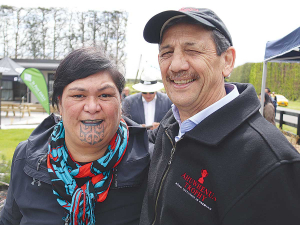Large-scale Maori hort project for Northland
The Government is sinking nearly $1 million into a major horticulture project in Northland to enhance Māori-owned land in the province.
 The boom in Maori is evidenced by the fact that last year’s Ahuwhenua Trophy awards included horticulture for the first time ever, with Maori Development Minister Nania Mahuta and awards chair Kingi Smiler among the many attending field days for the event.
The boom in Maori is evidenced by the fact that last year’s Ahuwhenua Trophy awards included horticulture for the first time ever, with Maori Development Minister Nania Mahuta and awards chair Kingi Smiler among the many attending field days for the event.
A new report estimates the gross output of Māori horticulture in New Zealand is around $220 million per year.
The report – from economic consultancy Berl and commissioned by Te Puni Kōkiri, the Ministry of Primary Industries and Horticulture New Zealand – shows growing Māori ownership in the sector. The research reveals eight times more Māori-owned businesses than previously thought. The report estimates that approximately 5% of the horticultural land in New Zealand is operated by Māori authorities, organisations and individuals, around 4000 hectares.
Around 1150 hectares are used to grow kiwifruit, the crop with the largest Māori share, followed by onion, squash, avocados and apples.
Māori own approximately 400,000 hectares of farmland, but more than half is used for sheep, beef and dairy farming and less than 1% is dedicated to horticulture.
“Our analysis looks at the extent and growth in Māori horticulture in recent years,” Berl says.
From 2006 to 2018, Māori have been increasingly investing in horticulture. “Now, with more than 4200 hectares of horticultural farms, the Māori horticulture industry has grown 300% in 12 years. This growth is expected to continue, with many iwi and Māori collectives planning expansions in kiwifruit, avocados and berries.”
According to the report, an estimated 3800 Māori work directly in the horticulture sector. This represents around 28 % of the workforce in horticulture, but they only occupy 4% of the leadership roles in the sector.
Donald Trump's latest tariff tantrum has again thrown the world of trade into a new round of turmoil and uncertainty, and NZ is caught up in it.
The third edition of the NZ Dairy Expo, held in mid-February in Matamata, has shown that the KISS principle (keep it simple stupid) was getting a positive response from exhibitors and visitors alike.
Twenty years ago, South African dairy farm manager Louis Vandenberg was sent to a farm in Waikato to provide training on Afimilk technology.
Strong farmgate milk price is helping boost investment on farms, says PGG Wrightson chief executive Stephen Guerin.
Fonterra's 460 milk suppliers in Australia, who will switch to Lactalis end of this month, are unfazed with the impending change.
The 5+ A Day Charitable Trust has launched a collection of affordable recipes designed to turn everyday vegetables into seasonal stars.